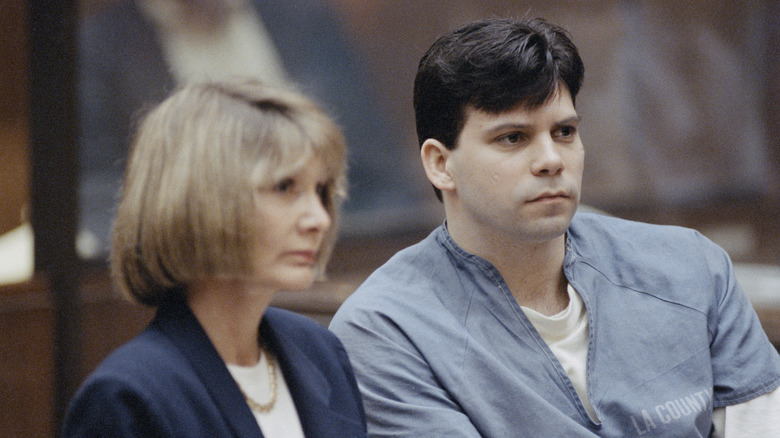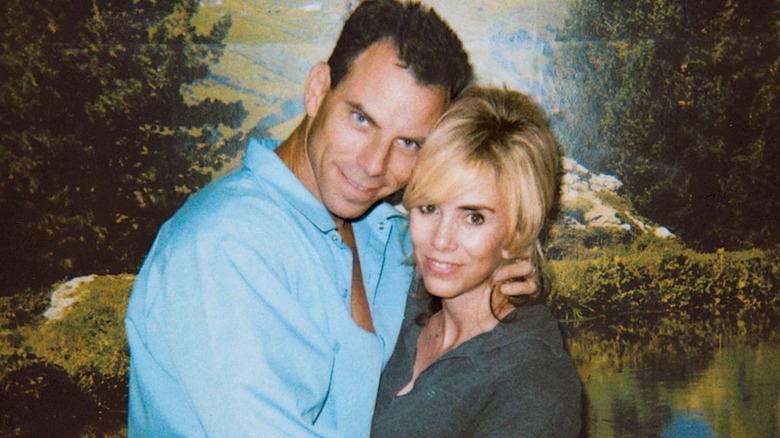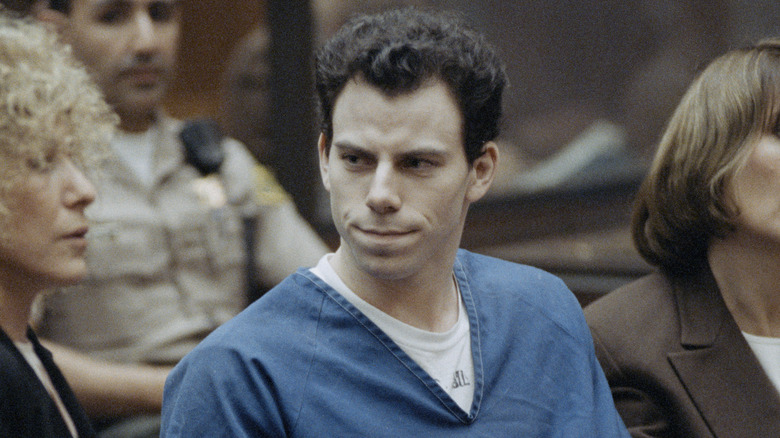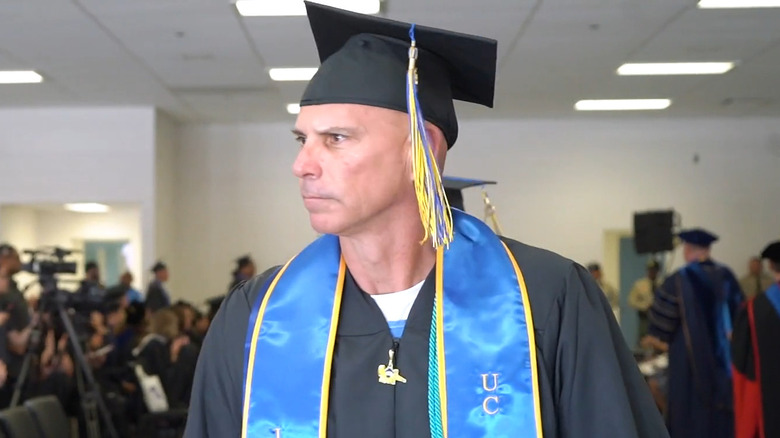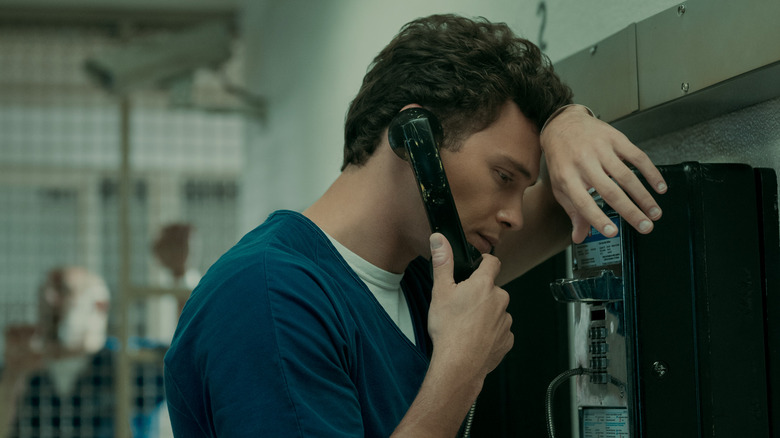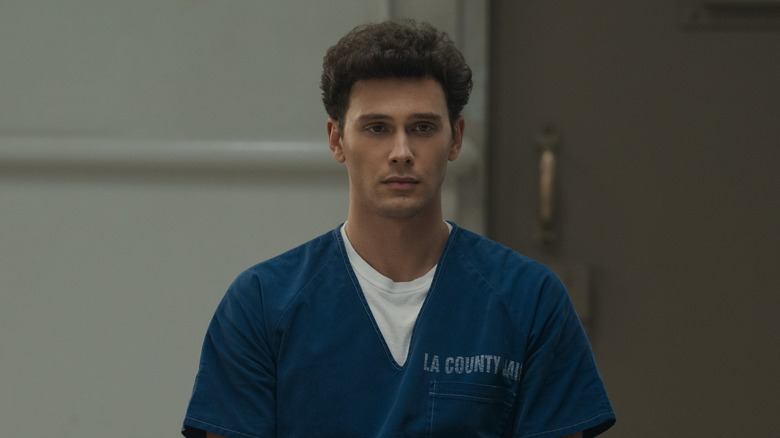What Happened To The Menendez Brothers After The Events Of Netflix's Monsters?
"Monsters: The Lyle and Erik Menendez Story" is the latest installment in the Ryan Murphy-created true crime series. The first season of the anthology show, "Dahmer – Monster: The Jeffrey Dahmer Story," presented the case of serial killer Jeffrey Dahmer, played by longtime Murphy collaborator Evan Peters, who went a bit method to get into the role. The series was brought back for two more seasons, with the Menendez's case as the second. "The Lyle and Erik Menendez Story" is a dramatization of the story of brothers Lyle and Erik, who were convicted of murdering their parents, José and Kitty Menendez. Their arrest and criminal proceedings were a media circus at the time and continue to remain relevant today as new developments unfold.
The miniseries ends with the brothers' sentencing and separation into different prisons after showing the investigation, first trial, and retrial after a hung jury, in addition to their lives before and during those events. However, that isn't the end of the story for Erik and Lyle Menendez. Since their sentencing in 1996, the brothers have continued to advocate for themselves, submitting appeals and petitions, while living in prison. Despite their incarceration, the two have gone on to have romantic relationships and participate in documentaries and rehabilitation programs. Here is what happened to the Menendez brothers after the events of Netflix's "Monsters: The Lyle and Erik Menendez Story."
They filed several appeals after their sentencing
After the brothers were sentenced to life in prison in 1996, Lyle and Erik Menendez took several different avenues to try to have their convictions overturned or be given a new trial. This began with their first set of appeals in 1998.
In the filed appeals, they contest a variety of issues they felt were present with their previous proceedings, citing a bias in the judge and concern over the evidence that was and was not permitted during the retrial. In an opinion over 100 pages long, the Superior Court maintained the brothers' convictions and denied their appeals. "We find no abuse of discretion in the rulings of the trial court and affirm the convictions based upon the overwhelming evidence presented against the defendants at trial," the opinion read, as recorded by the Los Angeles Times. "It's pretty much what we expected," Erik's attorney for the two trials, Leslie Abramson, said to the outlet. "We knew which way the wind would blow."
The Menendez brothers took their appeals a step higher by filing them with the California Supreme Court, who also upheld their convictions in a six-to-one vote in May 1998. The panel of judges ultimately voted against reviewing the case, meaning they maintained both the convictions and the decision made by the Court of Appeals, and had no intentions to make a different ruling of their own.
They married their wives while in prison
Though serving life sentences, Lyle and Erik Menendez continued to live their lives, both marrying during their incarcerations. In 1999, the younger of the brothers married Tammi Ruth Saccoman in a prison visiting room. The two began speaking in 1993 after Saccoman wrote to Erik while still married to her first husband. "I could see the pain in his eyes," she said in an interview with People in 2005. "I felt so sorry for him." Saccoman and Erik continued to exchange letters, even as she became a widow and tried to work through her emotions surrounding her first marriage. Before they were married, Saccoman flew out to see Erik several times, first in August 1997, before moving to the area so she could visit several times a week. Saccoman published a book about their relationship, "They Said We'd Never Make It," in 2005.
Four years later in 2003, Erik's brother had his own wedding. Lyle married Rebecca Sneed in a ceremony at Mule Creek State Prison, where he was incarcerated at the time. It's reported that the couple were wed in the visiting area of the prison, surrounded by about 12 family members and friends. The two had been in contact since Lyle's initial arrest. "We try and talk on the phone every day, sometimes several times a day," he said in an interview with People in 2017. "I have a very steady, involved marriage and that helps sustain me and brings a lot of peace and joy." However, in November 2024, Sneed announced their separation on Facebook, although she claimed that they remained "best friends and family" and that she will "never stop fighting for them." Sneed is Lyle's second wife. He married Anna Eriksson, a former model, reportedly in 1996 over the phone right before his sentencing hearing, though CNN reports the marriage took place in January 1997. The two divorced in 2001.
They filed habeas corpus petitions
After exhausting their appeal options, the Menendez brothers filed habeas corpus petitions. A habeas corpus petition is designed so incarcerated individuals can pursue legal action if they believe their sentence or detention does not follow accepted precedent and law. Lyle originally filed the first habeas corpus petition alone in 1999 with the California Supreme Court after the convictions were upheld during the previous appeals. The petition was denied.
The brothers filed additional habeas corpus petitions in 2003, which were also denied. They filed separately with the United States District Court, which took the petitions to the federal courts and outside of the California court system their previous appeals were under. The Menendez brothers cited evidence about what testimony and evidence they weren't allowed to submit during their retrial, which they believe may have resulted in a different decision from the jury if it had been deemed admissible in court. The petition also details that the tape recordings between Lyle, Erik, and their therapists should not have been allowed as admissible evidence. Like previous appeals, much of this stems from the decisions made during the brothers' second trial.
They filed an appeal with the Ninth Circuit Court of Appeals
After their 2003 petitions were denied, the Menendez brothers submitted their habeas corpus petitions to the Ninth Circuit Court of Appeals in 2005. The petitions cover five different issues that the brothers and their counsel believe impacted their rights to due process.
The filing argues that allowing the recorded sessions between the brothers and their therapist as admissible evidence, "the trial court's decision not to instruct the jury on imperfect self-defense," and that certain testimony was not allowed during the retrial were violations of the brothers' rights to due process. The appeal also states that Lyle and Erik's Sixth Amendment rights were violated because they weren't allowed to have "certain lay and expert testimony" during the retrial that would give them the chance to present their defense. The final point of the appeal questions if Lyle's right to due process was impacted "when the prosecutor commented on the lack of evidence regarding abuse and the lack of experts," in which the experts weren't allowed to testify and the evidence wasn't allowed to be presented.
In 2005, the Ninth Circuit Court of Appeals maintained the decisions made by the United States District Court. The petition was denied on all five counts, meaning the panel of judges determined that the Menendez brothers' rights were not violated as described in the appeal. The brothers' counsel cites other proceedings they believe were relevant and were comparable, but the Ninth Circuit did not believe the same situations were presented.
Erik was part of a docuseries
In 2017, Erik participated in a five-part docuseries with A&E to tell his story. "The Menendez Murders: Erik Tells All" focuses solely on Erik, featuring phone interviews from jail with him. Lyle's side and testimony is not at the forefront of the series.
In the exclusive interviews, Erik talks about his life leading up to the murder of his parents and the legal proceedings after his arrest. In addition to Erik, the series interviews his wife Tammi, famed author and host Larry King, reporter Linda Deutsch, and former Los Angeles District Attorney Christopher Darden, along with other professionals and individuals close to Erik and the case. "The Menendez Murders: Erik Tells All" uses these interviews, archival footage, and photos to retell the case from Erik's point of view, including how he prepared for the trials. The series isn't designed to retry the case and present new evidence, but to show it through the lens of Erik's interviews and give viewers new information about his life directly from him.
"My only hope in speaking out is that people may have a more complete understanding. A more complete understanding of the events that led up to my actions on the night of August 20th, and really a fuller picture of what really happened in my life," Erik said to A&E. "The tragedy didn't end on that night, as devastating as that night was. It didn't end there for my family, and it continues on to this day, and that sadness is something that I am trying to make up for with them and with my parents for the rest of my life."
They reunited in prison
"Monsters: The Lyle and Erik Menendez Story" ends as the brothers are separated, their vans driving in opposite directions to take them to their respective prisons. They were apart for two decades, each serving their life sentences in a different location initially. Lyle was in Mule Creek State Prison, near Sacramento, California, and Erik was in Folsom State Prison, just under an hour away from his brother.
In 2013, Erik was transferred to Richard J. Donovan Correctional Facility, which is near San Diego. Lyle joined him there on February 22, 2018. However, the Menendez brothers were housed in different units, meaning that while they may have seen each other across the yard, they weren't actually together. In April 2018, Lyle was moved to Erik's unit, marking their official reunion.
The brothers are housed in Echo Yard, a unit designed to help inmates with their rehabilitation. Inmates are moved there after patterns of good behavior and efforts toward cooperative rehabilitation during their incarceration. Those residing in the unit can participate in beautification projects, like when the Menendez brothers were part of a group that painted a mural in 2020, yoga classes, and training service animals.
They filed another habeas corpus petition
After denied appeals and petitions, the Menendez brothers submitted new filings in May 2023, citing new evidence that further establishes the abuse by their father. In a new habeas corpus petition, the brothers submitted evidence of a letter between Erik and his cousin detailing the abuse Erik experienced from his father, and a statement from Roy Rosselló, a former member of the boy band Menudo. In addition to this new evidence, the appeal cites a new California law that could allow for the Menendez brothers to be resentenced.
As reported by CNN, the letter was found by their cousin's mother, who shared it in 2018 with Robert Rand, a journalist who extensively covered the trials and case. The journalist later passed it along to Cliff Gardner, who was formerly a member of Erik's counsel. The letter would establish that the abuse was still very recent as of the time of the murders, which the brothers' defense team argued at the time.
As part of the documentary series "Menendez + Menudo: Boys Betrayed," Roy Rosselló said that Jose Menendez, Erik and Lyle's father and the executive at RCA Records who signed Menudo, sexually assaulted him. As reported by Rolling Stone, it is implied in the three-episode series that Menudo's manager Edgardo Díaz was allegedly complicit in the assault. Rosselló provided a sworn statement about the abuse from Jose Menendez, which was included as part of the 2023 petition to the courts.
Lyle earned his college degree
In 2024, Lyle shared during a virtual appearance at CrimeCon that he earned his bachelor's degree while in prison. He spoke on a panel through a phone call, since he was still serving his sentence at the time of the convention. "I got my bachelor's degree in sociology at UC Irvine," Lyle said, as reported by People. "It's the first time that a University of California university partnered with corrections to have a very small graduating class. I managed my way into it."
The program Lyle took courses through is part of continued efforts by the California Department of Corrections and Rehabilitation "to focus on true rehabilitation, justice, and safer communities statewide" as part of what is called the "California Model." The older Menendez brother is part of the first cohort of graduates in the program, all from Richard J. Donovan Correctional Facility. The only degree path at the moment is a bachelor's in sociology. The program is possible through the Leveraging Inspiring Futures Through Educational Degrees (LIFTED) program and the continued collaboration between the Department of Corrections and Rehabilitation and the University of California system. Inmates can take courses to earn an associates degree in sociology before transferring to UC Irvine to complete the final two years of school necessary for a bachelor's degree.
"I just decided even though I'm incarcerated and there isn't hope of freedom, I still have a chance to be a productive person and sort of feel like I'm proud of what I'm doing with my day," Lyle told People. "Education seemed like an obvious answer to that question." The oldest Menendez brother is hoping to earn his master's in urban planning.
They were part of a Netflix documentary
In addition to "Monsters: The Lyle and Erik Menendez Story," Netflix released the documentary film "The Menendez Brothers" in 2024. It features both Lyle and Erik speaking in exclusive audio interviews from prison, giving the audience more context about their lives and why they killed their parents. A variety of other individuals were interviewed, including Pamela Bozanich, who was the lead prosecutor for the first trial that resulted in a hung jury; journalists Robert Rand and Alan Abrahamson; and second trial juror Andrew Wolfberg, along with defense experts, professionals, and family.
The documentary received mixed reviews, with critics on Rotten Tomatoes split. The negative reviews describe "The Menendez Brothers" as having a clear bias and cutting out many parts of the story to suit it. The positive reviews credit the film with giving the audience the option to make their own decision based on the information presented across the interviews. While not one of the best documentaries on Netflix, audiences gave it a positive score on the Popcornmeter.
"The Menendez Brothers" debuted on the streaming service on October 7, 2024. Two days later, the official Netflix podcast "You Can't Make This Up" revealed that they would release three episodes to accompany the documentary. Titled "The Menendez Brothers: The Official Companion Podcast," they include extended and cut interviews of the brothers in prison and other individuals who were a part of the film.
The Los Angeles District Attorney recommended a resentencing
After the release of "Monsters: The Lyle and Erik Menendez Story," there was renewed interest in the case and questions about the status of their 2023 filing. In a news conference on October 3, 2024, Los Angeles County District Attorney George Gascon confirmed it was under review. "We're not, at this point, ready to say that we either believe or do not believe that information," Gascon said in the conference, as documented by Fox News. "But we're here to tell you that we have a moral and ethical obligation to review what is being presented to us and make a determination."
Several weeks later on October 24, Gascon announced he was recommending a resentencing of Lyle and Erik Menendez based on the evidence presented in their 2023 habeas corpus petition. The brothers were sentenced to 50 years to life in prison with no possibility of parole rather than the death penalty at their original sentencing. In a resentencing, parole could become possible because they were both under 26 years old when they killed their parents. If the case were to go up against the parole board, who would have the final decision should it progress that far, they could decide the Menendez brothers have served their time and release them. This recommendation does not change what the brothers have already been charged with — it only changes what their sentence could be. Gascon made this recommendation due to their behavior and rehabilitation efforts in prison, but felt the charges stood because of "the premeditation that was involved."
With Gascon's recommendation in mind, the Los Angeles County Superior Court Judge Michael Jesic scheduled a resentencing hearing for the Menendez brothers. The decision came on October 30, 2024, less than a week after the District Attorney gave his recommendation to the courts. Erik and Lyle were denied parole in August 2025 and must wait three years for another hearing.

